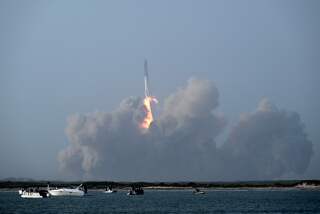F-35 fighter jet program reaches milestone with vertical takeoff
- Share via
The F-35 fighter jet, a nearly $400-billion weapons program under development for more than a decade, hit a major milestone when it completed its first-ever vertical takeoff.
On Monday, aircraft manufacturer Lockheed Martin Corp. released a video in which an F-35 lifted vertically like a helicopter and hovered above the tarmac.
The Bethesda, Md., company said the test flight took place May 10 at Naval Air Station Patuxent River in Maryland.
The F-35’s vertical takeoff is a complex engineering feat that uses engine thrust vectoring by redirecting exhaust to the ground to achieve the vertical lift. This version of the plane is designed for the Marines.
In all, there are three versions of the F-35 being developed for the Pentagon.
Called the Joint Strike Fighter program, it is centered around a plan to develop one basic fighter plane that could -- with a few tweaks -- be used on runways and aircraft carriers, and hover like a helicopter for joint use by the Air Force, Navy and Marine Corps.
The Pentagon’s long-term vision is to replace today’s aging fighter fleets with 2,443 F-35s.
The Marine version is expected to be the first of the three versions to go into service. It’s scheduled to be delivered in the summer of 2015.
If the plane is successful, it will be the first time a fighter jet will have supersonic speed, radar-evading stealth and short takeoff/vertical landing capabilities.
The F-35 program is billions of dollars over budget and years behind schedule. The per-plane cost estimates have gone from $81 million in 2001 to $161 million today, according to the Government Accountability Office.
But Lockheed has promoted the fact that the F-35 provides 127,000 direct and indirect jobs in 47 states and Puerto Rico. The company expects to pump an estimated $6 billion into California’s economy and create 27,000 jobs.
ALSO:
Solar airplane begins first leg of trip across America
Supersonic flight brings Virgin Galactic closer to space
Experimental aircraft speeds to more than 3,000 mph in test flight
More to Read
Inside the business of entertainment
The Wide Shot brings you news, analysis and insights on everything from streaming wars to production — and what it all means for the future.
You may occasionally receive promotional content from the Los Angeles Times.











